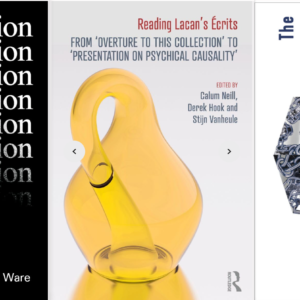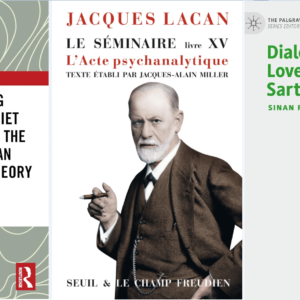News – January 2015
Due out in the next few days is the latest edition of Hurly-Burly , the New Lacanian School’s international journal of Lacanian psychoanalysis. Among the highlights of edition 12 is a translation of the 1974 interview Lacan gave to the Italian magazine Panorama (previously referenced on this site here); Gil Caroz’s argument that forms the theme of the NLS’s Congress in May – ‘Moments of Crisis’; and Jacques-Alain Miller’s argument for next year’s World Association of Psychoanalysis conference on ‘The Unconscious and the Speaking Body’. Also included is a translation of a chapter from Nathalie Jaudel’s recent book criticising Elisabeth Roudinesco’s biography of Lacan, with the full publication to due out in the near future. Keep an eye on Karnac Books or the ECF’s online shop over the next few days for a link to buy Hurly-Burly. Edition 12 will be the last edition under the direction of Victoria Woollard, who will be leaving her position as Editor-in-Chief of the journal, with Marie-Hélène Brousse to assume responsibilities for the next four issues to come.
Several other new publications were either released or announced last month. Among the books, Tim Themi’s study, Lacan’s Ethics and Nietzsche’s Critique of Platonism, first published in May last year, was released in paperback in January. Due out in February is a new volume of essays edited by Patricia Gherovici and Manya Steinkoler, Lacan on Madness: Madness, Yes You Can’t. It contains essays written on the problem of madness by many prominent Lacanians. Finally, looking ahead to July, Routledge announced Ellie Ragland’s Jacques Lacan and the Logic of Structure, which looks at Lacan’s later topological work.
Among the journals, JCFAR, the Journal of the Centre for Freudian Analysis and Research, released issue 25 last month on Child Analysis. CFAR has been running Child Analysis Working Groups for some time now, and the work of those groups forms the content of this latest edition.
Lastly, a special mention has to be made for the commentaries presented in the aftermath of the terrorist attacks in Paris last month by some of France’s most notable Lacanian commentators, many of whom wrote pieces for French media sources discussing its impact. Chief among these was Jacques-Alain Miller, who penned four separate articles for Le Point in the days following the atrocities. These have been translated into English as The Return of Blasphemy, The Lyric Illusion, France Loves its Cops, and Charlie’s Secret. Several editions of the French online journal Lacan Quotidien (The Daily Lacan) were devoted to Charlie Hebdo and to a discussion of the events that followed the attacks against it. These can be found – in French – on Lacan Quotidien’s archives here.
Podcasts of two interviews with translator of the Écrits, Bruce Fink, in which he discusses the twin volumes of his most recent books, Against Understanding, appeared online last month (the first here and the second here). Check out the rest of the site – http://newbooksinpsychoanalysis.com/ – for more interesting podcasts on psychoanalysis from other orientations. Those interested in a sample of Fink’s work from these books might want to check out one of his essays from the second volume of Against Understanding – ‘Lacan on Personality from the 1930s to the 1950s’.
Two new video lectures on Lacanian theory which appeared on YouTube in January may be of interest. The first, ‘The Borromean Knot of Jacques Lacan; Or, How to Beat Your Death Drive’ is Aron Dunlap’s talk at Shimer College on Lacan’s later work using this topological model to knot his three registers that constitute human subjectivity. The second is Dr. Jochem Willemsen’s open seminar at the Centre of Psychoanalytic Studies at the University of Essex on ‘The Clinical Lacan’, which focuses specifically on the L-schema that Lacan introduces in the Rome Discourse in 1953.
Among the events last month and coming soon, January saw a spirited debate in London between Eric Laurent and Catherine Malabou on the relation between psychoanalysis and the cognitive sciences. Audio of the debate can be found here (thanks to Backdoor Broadcasting for the recording, and to the Department of Psychoanalysis at the University of Kingston, and the London Graduate School for hosting). Malabou defended her hypothesis put forward in her The New Wounded that psychoanalysis reaches its limit where it encounters clinical ‘events’ which are meaningless, contingent, and as such unassimilable to hermeneutics or interpretation, the effects of psychotherapy. Alzheimer’s, for example, demonstrates no link between what Malabou calls ‘cerebrality’ and the personal history psychoanalysis takes as its object. Sufferers like these are the ‘New Wounded’ described in her book. For his part, Laurent pointed to jouissance as a primordial body event which, stemming from the drive, is open to contingency insofar as it cannot be predetermined. The traumatic event of jouissance has to be thought of in relation to the experience of sexuality beyond the pleasure principle. Indeed, sexuality as the mark of castration, is in itself a PTSD that would be unassimilable in the way that Malabou describes it. The properly psychoanalytic approach to these contingent ‘body events’ therefore is to look not to biology but to the death drive – not something biological, but something which exceeds biology, and which is known in Lacanian terms as jouissance. If there was common ground between Malabou and Laurent’s separate positions by the end of the debate it was in the stressing of the trauma and its effect on the body.
Plenty other events due in the next month around the Lacanian world. Firstly, the Après-Coup Psychoanalytic Association in New York will also continue its seminar series ‘Introducing Lacan: On the Three Registers’ with David Lichtenstein. The next seminar takes place on 4th February and is free and open to all.
Secondly, the Irish Circle of the Lacanian Orientation will be hosting a seminar on 7th February with Marco Focchi entitled “What is the Unconscious made of?”. The group also continues its seminar series looking at Lacan’s Seminar X on Anxiety in Dublin with a talk by Claire Hawkes on 27th February. Full details of that talk here.
Thirdly, the Cyprus Society of the School of the Freudian Letter will be hosting Lacanian psychoanalyst Philip Hill for two talks coming up in February. Hill will be discussing The Agency of the Letter in Immunogenetics and Psychoanalysis and Is Science a Woman?.
Announced for the near future, the SITE for Contemporary Psychoanalysis will be hosting its spring conference on Conflict in London on 16th May, for which it released more details in January. The Keynote Address will be by Josh Cohen, Professor of Modern Literary Theory at Goldsmiths, University of London, psychoanalyst in private practice and author of ‘The Private Life: Why we Remain in the Dark’. More details of the programme for the conference are here and details of how to book here.
The Euro Federation of Psychoanalysis has put out a call for papers for its third PIPOL congress on 4th and 5th of July in Brussels. With the overall theme of ‘Victims’, the group has set out ten areas within the theme that could serve as guidelines for its work. Proposals should be sent by 15th March, with details of how to submit on the WAP’s site here. PIPOL has also launched a blog for the Congress which can be found at http://www.pipolnews.eu/.
For Londoners, an offer to Lacanians from Southwark Playhouse for the 2nd March performance of analytically-inspired, Pulitzer Prize-winning play How I Learned to Drive might be of interest. Tickets are £12 when using code PSYCHOLOGY to book. The performance is followed by a post-show talk between broadcaster Claudia Hammond in conversation with clinical psychologist Lucy Maddox. Book here.
Finally, for French speakers, psychoanalyst Jean-Claude Maleval drew our attention in January to a newly-opened site, Écouter les Autistes, which has been put together by a group of psychoanalytically-orientated clinicians as an intervention in the political debates concerning the most appropriate treatments for autism, and taking as its basis the testimonies of autistic individuals themselves.
Got news? Get in touch.




Leave a Reply